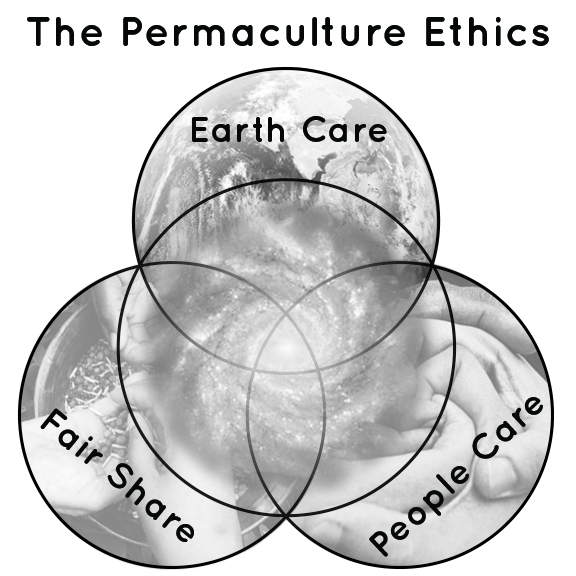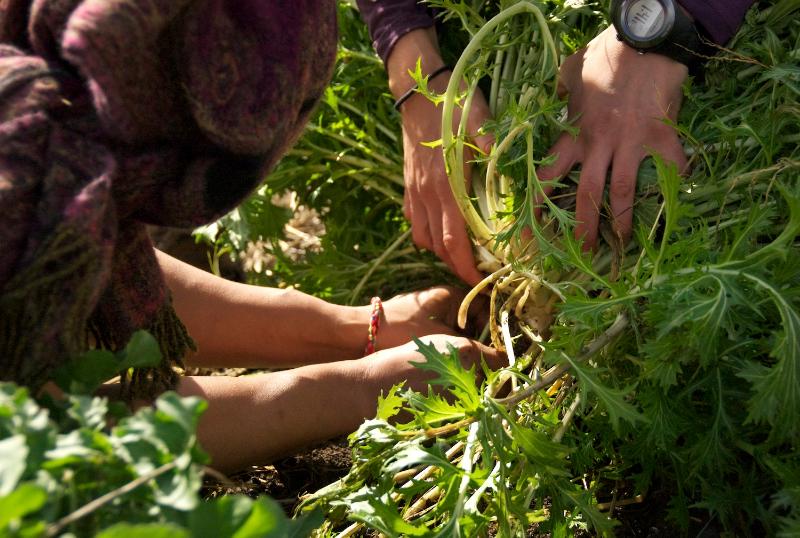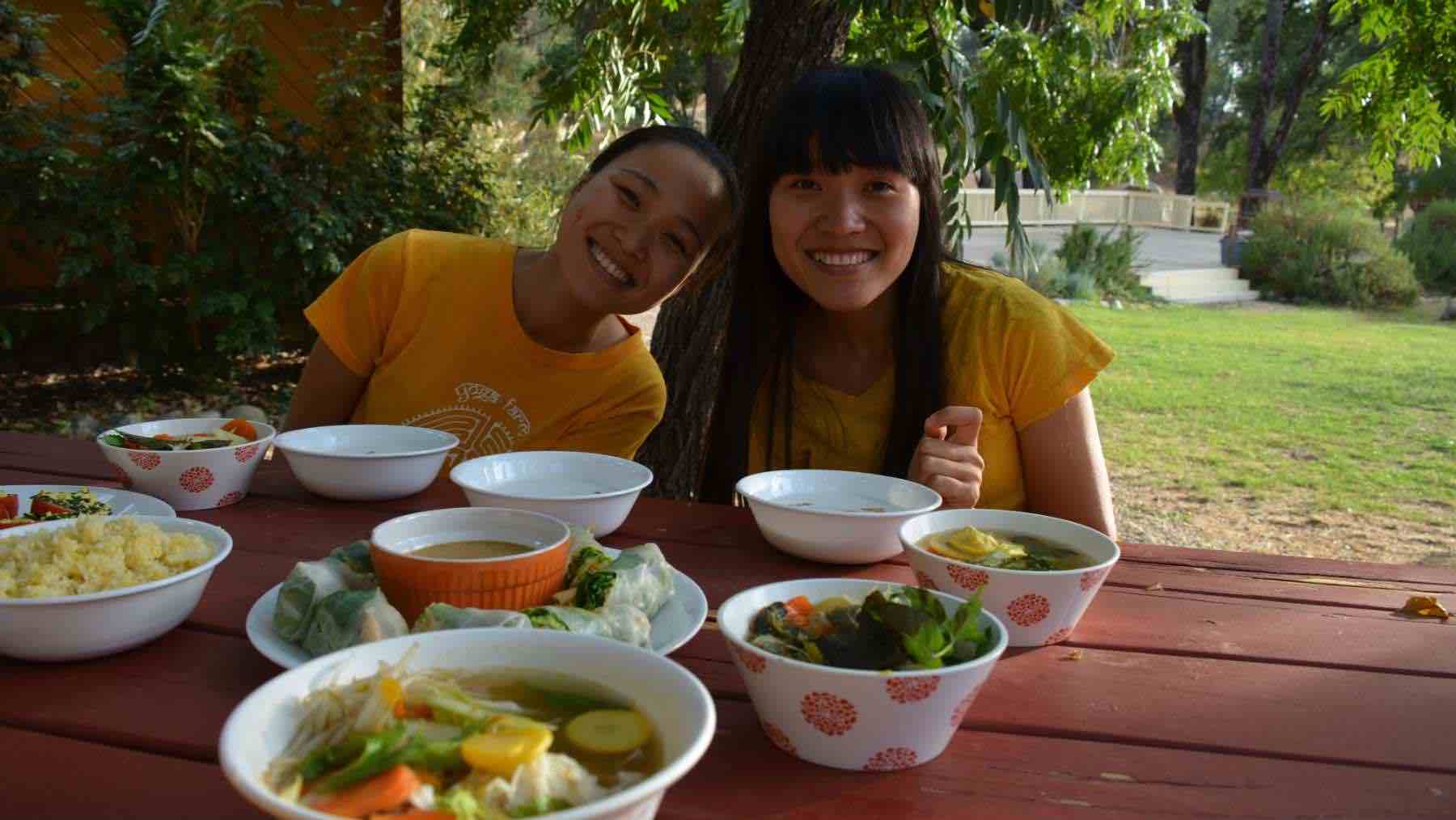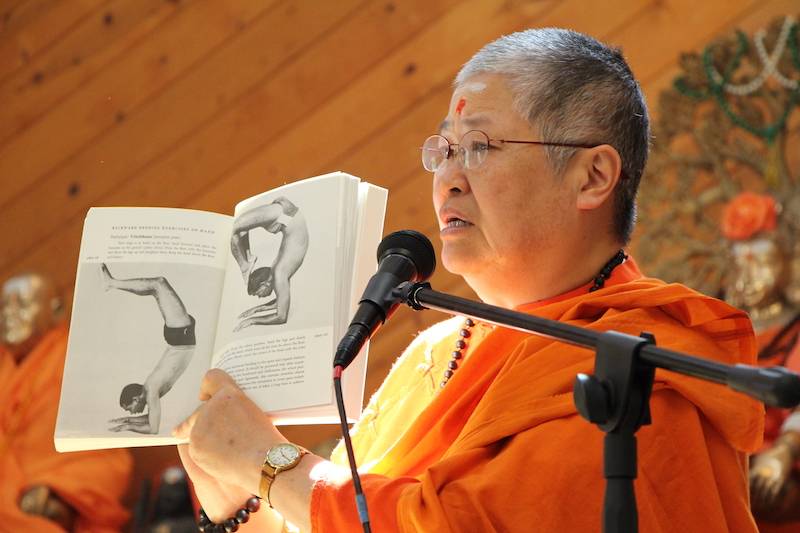Yoga and Permaculture Ethics
Colin Eldridge (Krishna Das)
Yoga Farm Staff
Krishna Das teaches and helps coordinate Yoga and Permaculture programs at the Sivananda Yoga Farm.
“Yoga is permaculture and permaculture is yoga life.”
– Swami Sitaramananda
There is a strong ethical congruence between Yoga and permaculture. Both disciplines are sciences that bolster the philosophy of non-violence, non-greed and right livelihood.
Living in positive relationship with everything and everyone around us is the foundation of yoga life and permaculture practice. In this article, we will examine the links between the ethics of both permaculture and yoga.

The ethics of permaculture are earth care, people care and fair share (or set limits and redistribute the surplus).
Earth Care
Earth care means tending to Mother Earth’s ecosystems and supporting the balance of all life. In other words, Earth Care is about living in symbiosis with natural systems, with the understanding that our survival depends on the health of the whole.
In order to support this ethic, humans must stop polluting and destroying the planet. Furthermore, this ethic points out that we have a responsibility to heal the damage that has already been done using ecological restoration and regenerative design.
People Care
From a permaculture perspective, the way we treat the earth is inextricably linked to how we treat fellow humans. From this understanding, we learn that people care is about dismantling oppressive power structures and building resilient communities.
Fair Share
Fair share is also called “future care”. It is often explained as setting limits to consumption and redistributing the surplus. It implies not only sharing with those who need it when resources are abundant, but also applying self regulation now so that future generations can prosper.

The Ethical Foundation of Yoga
The ethics of Yoga are called the “Yamas and Niyamas,” or restraints and observances. For some, the first step on the spiritual path is disciplining oneself to follow the ethics, which ultimately comes from a place of incredible compassion for all beings.
Yamas (Restraints)
1. Ahimsa: Non-Violence
Ahimsa teaches that all life is sacred. All beings share the same life force, so it is important to cherish and protect all life. This applies socially (people care) and ecologically (earth care). When you hurt or destroy life, you are destroying an opportunity for survival and joy.
Oppression is violence. Hurtful words are violence. Social control is violence. Ahimsa asserts that when you oppress another, you traumatize not only that person, but you hurt every other being in the universe and you hurt yourself as well.
“Although initially we can see how helping our family and friends assists us in our own survival, we may evolve the mature ethic that sees all humankind as family, and all life as allied associations. Thus, we expand people care to species care, for all life has common origins. All are ‘our family’.”
– Bill Mollison, Permaculture: a designer’s manual
2. Satya: Truthfulness
Truthfulness means not only abstaining from telling lies, but also aligning words and conduct with the highest Truth, which is that we are all one. It means only speaking words that lead or point to that one Truth. Following people care means making sure that there is mutual understanding rather than falsehood and lies.
Truthfulness applies to business interactions, in communities, and with ourselves. Truthfulness means never trying to confuse or convolute a situation, or hide the truth by covering things up. As long as your words are used to uphold justice and peace, you are following truthfulness.
Non-stealing as it relates to permaculture means leaving enough for all other organisms in nature, not taking land, resources or culture from other people without asking, and never taking more than you need in any situation.
When you eat more than you need to survive, it is basically like stealing from a starving person. We live in a society of over-abundance of food, consumer products, and non-renewable resources. Yet there is still too much waste and people who lack resources. The earth is bountiful – the problem is uneven distribution, not scarcity.

When we take only what than we need, there is enough bounty for everyone.
4. Brahmacharya: Chastity, sublimation of sexual energy
Brahmacharya is a vital practice for the ethic of people care. It is about redirecting our vital energy towards selfless service and spiritual practice rather than constantly chasing worldly pleasures.
Interestingly, Brahmacharya means much than just celibacy. It is a moral code of conduct that teaches to never objectify or take advantage of others. Following brahmacharya means treating everyone as members of one divine family.
5. Aparigraha: Non-greed
Greed is one of the main causes of harmful economic development and ecocide, so obviously non-greed is congruent with earth care. Aparigraha can also be translated as non-acceptance of gifts of bribes.
This doesn’t mean that we should never accept gifts form others, but to not accept gifts with ulterior motives. This ethic relates to fair share in that we learn when giving to others, not to expect something in return but to just give in the spirit of giving.

When we share our abundant gifts, it brings more joy into our own and others’ lives.
Niyamas (Observances)
1. Saucha: Purity (Internal and External)
Saucha can also be translated as purity or cleanliness. External purity is keeping the body and the environment clean, which helps to prevent disease and keep the mind stay clear and positive. The implications are simple: don’t waste and don’t pollute.
Internal purity means working towards purifying the heart and mind by removing anger, greed, hatred and jealousy. All of your actions will be for the betterment of the world when internal purity is attained.
This ethic is inspiration to design a life that produces no waste, both internally and externally . In these ways, purity relates to the permaculture ethics of earth care, people care and fair share.
2. Santosha: Contentment
Santosha teaches to be content with what we have. When we learn to desire less, we will suffer less. As a result, we will hurt others and the planet less, thus following earth care and people care.

We never know what life will bring us. Practicing contentment helps us cope with whatever comes our way – good or bad.
3. Tapas – Austerity
All practices of Yoga are Tapas. In Tapas the mind and body are trained to do things they might not initially like. Eventually the practitioner overcomes likes and dislikes and enjoys everything. Austerity also implies discipline and purposely living with less than you may be used to.
Application of this ethic supports people care in that it leads a person to have fortitude, cheerfulness, and simplicity. Fair share is more easily applied when people follow austerity because when we all live with a little less there is more to go around. When we consume and use less, the earth is damaged less.
4. Swadhyaya – Study of Scripture / Self-study
Svadhyaya encourages us to actively work on seeing our true nature as spirit through self inquiry and study of scripture. When we feel spiritually connected it will bring inner peace, which will allow our actions to bring more harmony to the world.
Study of spiritual scripture and introspection bestows the nectar of eternal knowledge and wisdom. It supports one on the path towards liberation. It will inspire the aspirant to keep treading on the spiritual path.
This adds a spiritual dimension to the permaculture ethics, helping us to connect with the Truth and the rich teachings of Yoga. Additionally, it adds meaning to our life, which keeps us going happily as we apply permaculture to the world.

Taking time to learn from scripture and look within helps us feel more connected and inspired.
5. Ishwara Pranidhana – Surrender of the Ego
Surrendering the ego means to let go of the selfish and separate nature and contemplate on pure consciousness. One experiences pure consciousness when all phenomena are observed as a silent witness, without attachment, and one rests in a state of pure bliss.
When Ishvara Pranidhana is practiced perfectly, one sees themself as part of everything else. The universe is an organism and your body is just one cell of it. Instead of trying to control things or do everything for your own gain, you devote yourself to humbly serving the bigger picture.
Humans commit atrocities only when they forget their spiritual connection to oneness; only when they identify with the limited Ego. How can you hurt anything or anyone if you know that they are your own Self?
“Cooperation, not competition, is the very basis of existing life systems and of future survival.”
– Bill Mollison, Permaculture: a designer’s manual
Theory into Practice
“A ounce of practice is worth a ton of theory” – Swami Sivananda
While all of these ethics are nice ideas to think about, they only do good if they are applied vigorously in daily life. And to put it frankly, nobody said it would be easy. Applying the ethics takes a lot of dedication, hard work and perseverance.
The ethics require us to be stewards of our actions in every moment. In this day and age of unprecedented ecological destruction and social chaos, applying the ethics is vital for not our survival but also for our happiness in life.
We can radically transform the world by transforming our inner landscape through the Yamas and Niyamas. Similarly, the permaculture principles will help us change the world by guiding our interactions and relationships to be more mutually beneficial.
Yoga and Permaculture offer the tools, knowledge and wisdom to transform the world to embody our highest ethics. Through the regular and sustained practice of yoga and permaculture, together, we can manifest a truly peaceful paradise.
“A person of courage today is a person of peace.”
– Bill Mollison, Permaculture: a designer’s manual



0 Comments